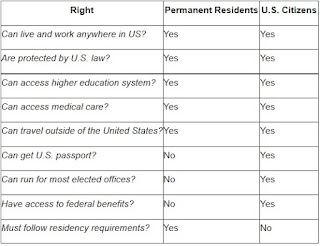Click image to submit question
Permanent Resident vs. Citizen: What's the Difference?
Lawful Permanent Resident:
A lawful permanent resident is someone who has been granted the right to live in the United States indefinitely. Permanent residents are given what’s known as a “green card,” which is a photo ID card
that proves their status. (But it is no longer a green.)
Permanent residence includes the right to work here and to petition for close family members (your spouse and unmarried children) to receive permanent residence and join you. However, your family
members will be considered “preference relatives,” meaning that only a limited number of immigrant visas are available to people in this category per year, and so they are likely to spend five or more years on a waiting list before being allowed to enter or remain in the United States or get a green card.
Permanent residents continue to remain the citizen of another country. So every time you travel outside the United States, you must carry the passport of that country as well as your green card.
You will use your green card to reenter the United States. There are important limitations on lawful permanent residents’ rights, however. You do not have any rights to vote in U.S. elections. If you leave the United States with the intention of making your home elsewhere, you will be considered to have abandoned your residence and given up your green card.
U.S. Citizen:
People can become U.S. citizens by birth in the United States, through U.S. citizen parents
(depending on the laws in effect at the time of their birth), or through the process known as naturalization.
A U.S. citizen is eligible to receive a U.S. passport, which is issued by the U.S. State department.
Many countries allow visa-free travel for U.S. citizens.
A U.S. citizen can leave and reenter the U.S. at any time without being subject to the grounds
of inadmissibility or requiring a reentry permit. There are no restrictions on the number of days
you can remain outside the United States.
U.S. citizens can vote in U.S. federal and local elections, hold certain government jobs, and serve on juries. Many federal and state government grants, scholarships and benefits are available only to U.S. citizens.



